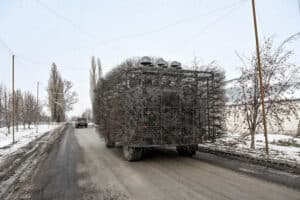That legislation did not provide for the granting of presidential immunity.

The granting of diplomatic immunity to Russian President Vladimir Putin by the South African government does not override its obligations to execute an International Criminal Court (ICC) arrest warrant against him, but shows the government is taking “desperate” measures to get out of the predicament of a visit by Putin in August, according to a political expert.
Professor Dirk Kotzé of the political sciences department at the University of SA, said the country had signed the ICC’s Rome Statute and incorporated it into law so the obligation to execute the warrant on Putin would take precedence over any local legislation.
Legislation
That legislation did not provide for the granting of presidential immunity. However, while it might be possible to argue that international law did not allow for the arrest of a sitting president by another country, this specific clause was not included in the incorporation of the Rome Statute into SA law.
The Rome Statute made it clear, Kotzé added, that diplomatic immunity was not relevant in cases where a person was charged with genocide, crimes against humanity or war crimes – charges which had been levelled against Putin.
Kotzé’s assessment was the same as that of the department of international relations and cooperation, which announced yesterday that it would provide diplomatic immunity to all attendees of the two meetings involving Brics (Brazil, Russia, India, China and SA) countries.
“This is a standard conferment of immunities that we do for all international conferences and summits held in SA, irrespective of the level of participation.
“The immunities are for the conference and not for specific individuals. They are meant to protect the conference and its attendees from the jurisdiction of the host country for the duration of the conference,” it said.
The department added: “These immunities do not override any warrant that may have been issued by any international tribunal against any attendee of the conference.”
ALSO READ: Arrest warrant for Putin a ‘spanner in the works’
Imposotion
Professor Ntsikelelo Breakfast of the history and political studies at Nelson Mandela University said SA was “caught between a rock and a hard place” over Putin, not wanting to alienate the Russians while, at the same time, needing to keep good relations with the US and other North Atlantic Treaty Organisation countries.
If Putin was to be given immunity, there was a possibility of America imposing “soft sanctions” on SA. “The policy of neutrality or non-alignment is catching up with us,” he said.
Meanwhile, the Democratic Alliance (DA) said yesterday it had taken legal action to force the government to arrest Putin if he attended the planned Brics summit.
“This pre-emptory court action aims to ensure that South Africa upholds its obligations,” DA shadow minister of justice Glynnis Breytenbach said in a statement.
She said the DA was seeking a “declaratory order” to avoid a repeat of 2015, when Pretoria failed to arrest then-Sudanese president Omar al-Bashir, who was similarly wanted by the ICC. Kremlin spokesperson Dmitry Peskov yesterday declined to say whether Putin would travel to SA for the summit.
NOW READ: SA faces legal bid to force Putin’s arrest
Additional reporting by AFP
Support Local Journalism
Add The Citizen as a Preferred Source on Google and follow us on Google News to see more of our trusted reporting in Google News and Top Stories.






